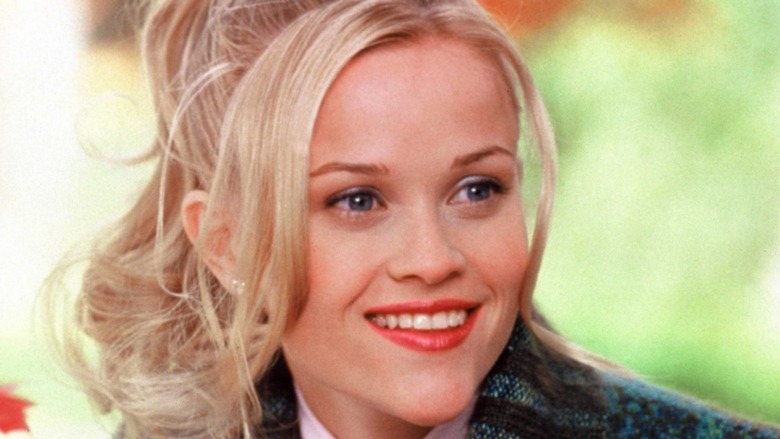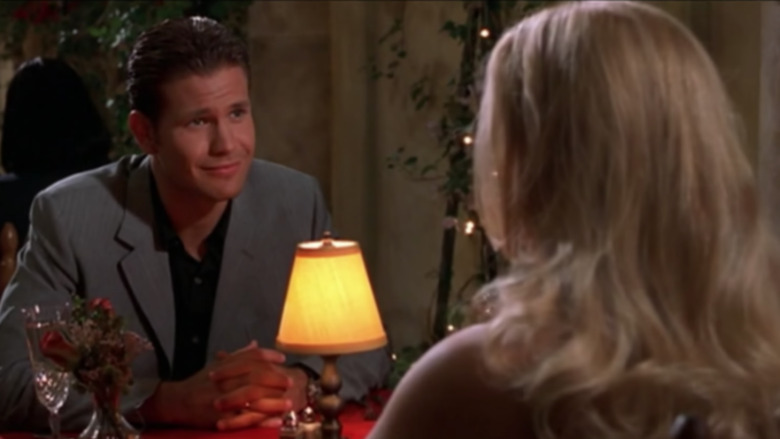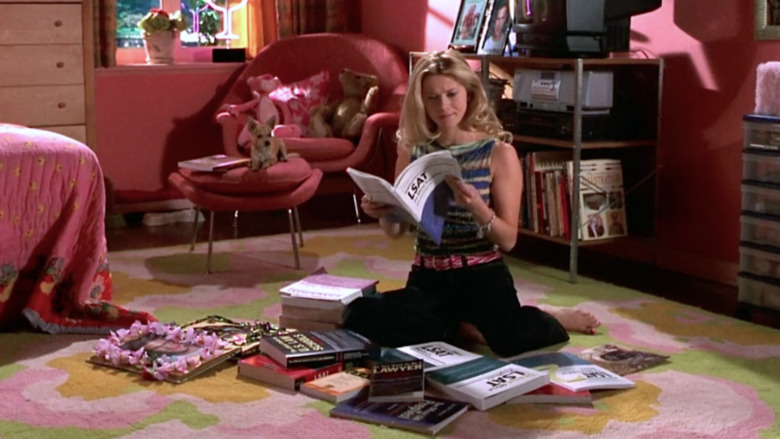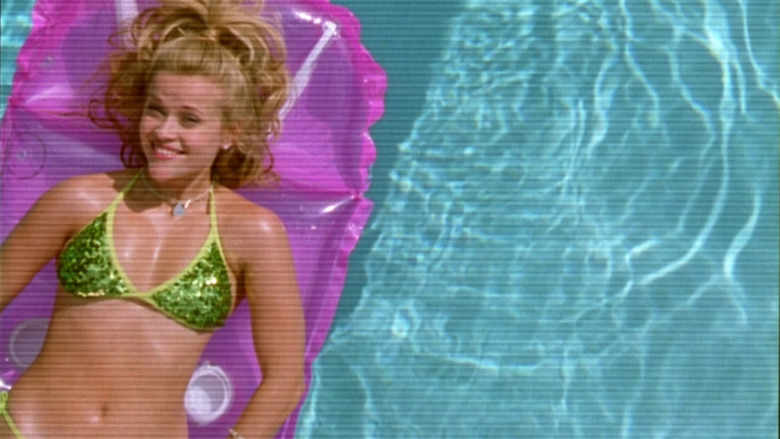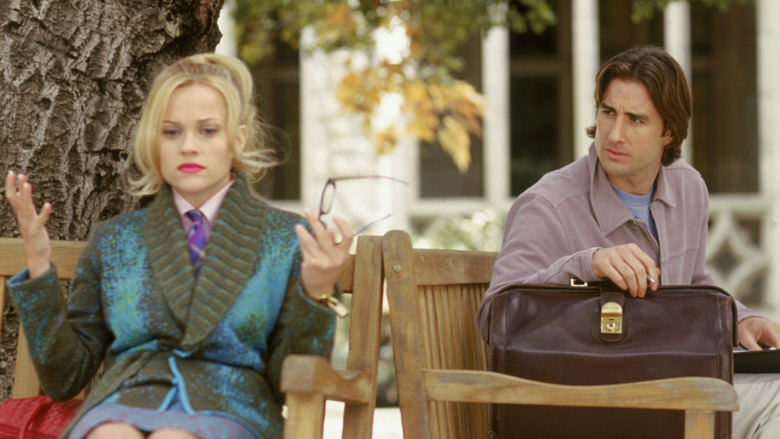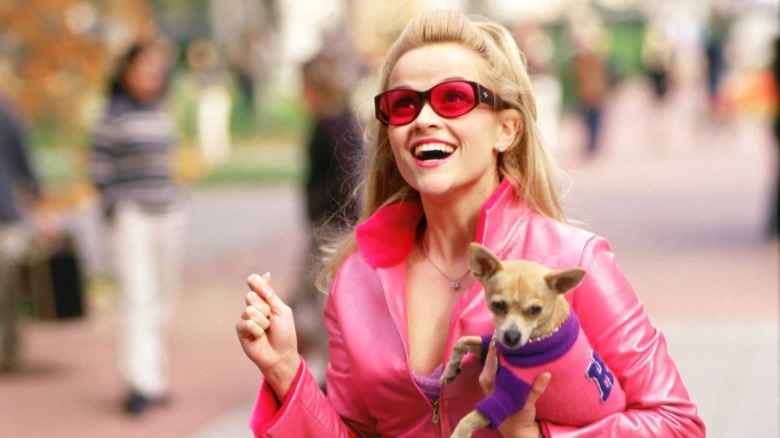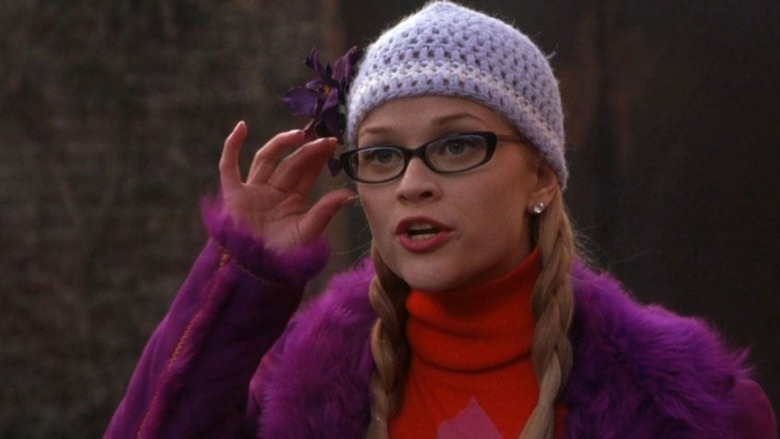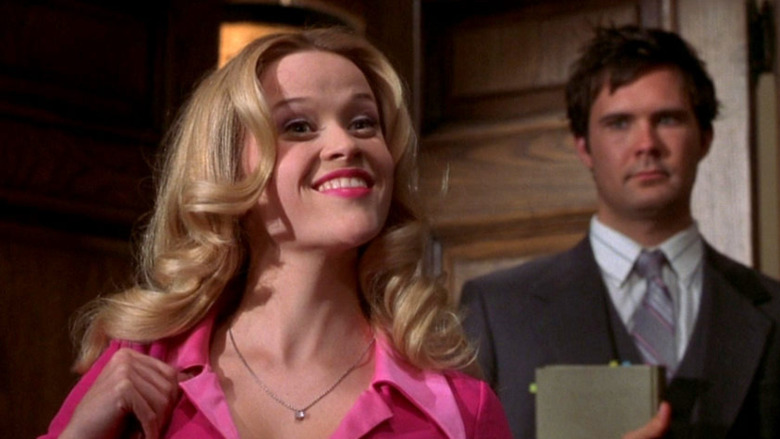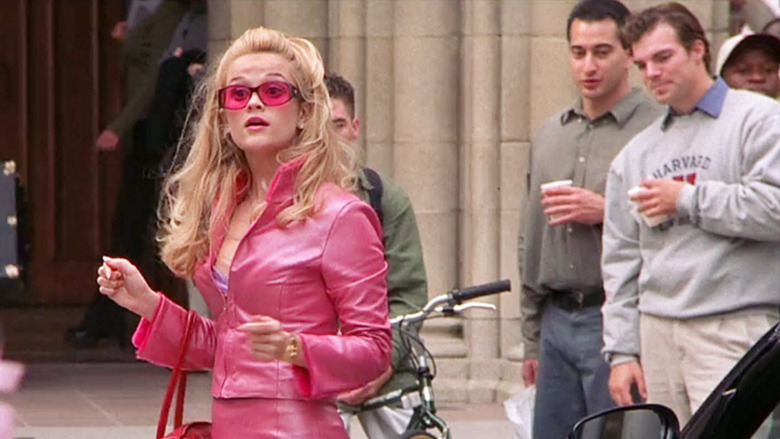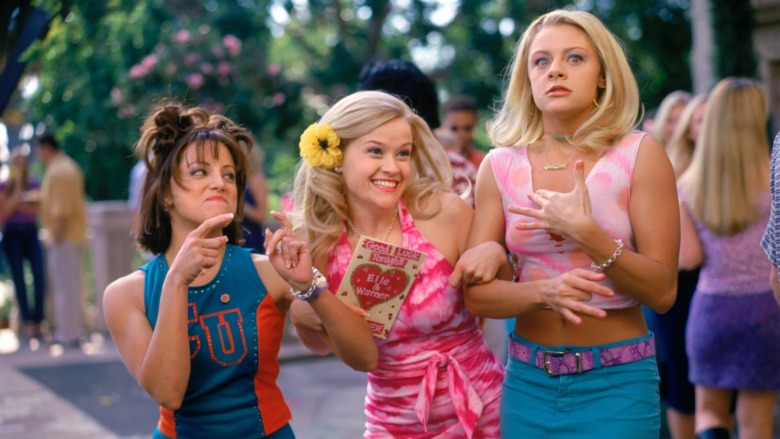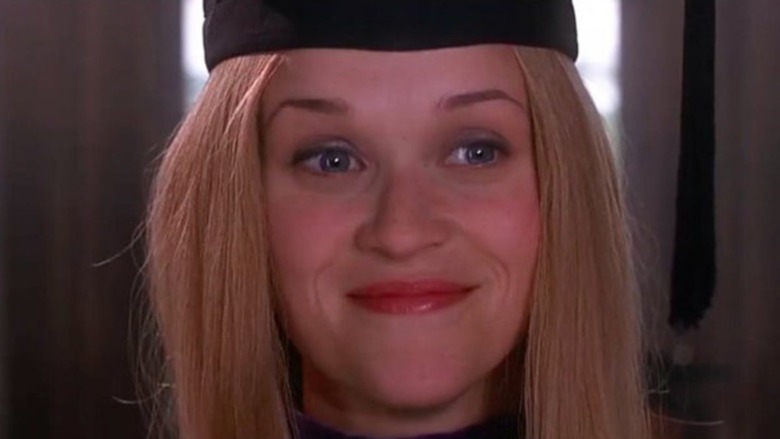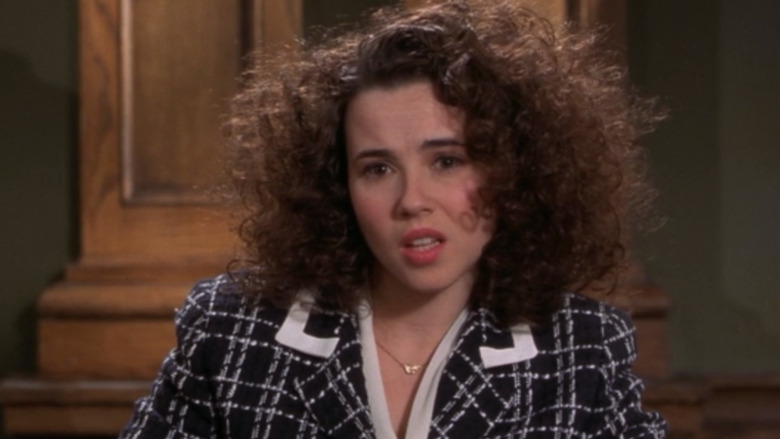Things You Missed In Legally Blonde As A Teen
In the summer of 2001, Reese Witherspoon introduced the world to one of her all-time best characters: Elle Woods, Legally Blonde's irrepressible heroine. The story of a plucky sorority girl who manages to get herself into one of the country's best law schools after her boyfriend dumps her, Legally Blonde is one of the most uplifting and rewatchable comedies around.
Many fans first watch Legally Blonde in their teen years — it's ideal sleepover material, after all. Though it's enormously fun to enjoy this film at that age, there's a lot you may not have noticed in this film if you watched it before you were a legal adult. You probably remember the bend and snap, but do you recall the nuances of law school Legally Blonde portrays? How about the surprising cameos it pulls off? We're here to catch you up on everything you missed watching Legally Blonde as a teen. What, like it's hard?
Warner really isn't all he's cracked up to be
As the film opens, Elle's Delta Nu sorority sisters present her, their chapter president, with a thoughtful card congratulating her on what they assume is her imminent engagement to her perfect, wealthy, and handsome boyfriend, Warner Huntington III (Matthew Davis). After picking the perfect outfit to become a fiancée in, Elle heads to a fancy restaurant with Warner ... only to be blindsided by a break-up.
It's bad enough that Elle gets dumped instead of a diamond ring, but the way Warner does it is particularly awful. He says he needs somebody "serious," and that he's looking for a "Jackie" — as in former First Lady Jacqueline Kennedy Onassis — and not a "Marilyn" — as in blonde bombshell Marilyn Monroe. (To make Warner's comments even worse, Monroe was known for her brains, despite her ditzy appearance.) When Elle has a complete breakdown in front of the whole restaurant, complete with hysterical sobs, Warner just seems exasperated, and blames her tears on a "bad salad."
As teenagers, we often react to break-ups in, shall we say, dramatic ways. The extreme lengths Elle goes to in an effort to win Warner back make sense to us, at that age. But to adult viewers, Warner is an obvious jerk from the start. Really, freeing Elle of his obnoxious presence is the only good thing he does!
Elle's LSAT score is nearly perfect
As Elle prepares her law school application, her college advisor tells her that Harvard probably won't be impressed by her fashion merchandising degree, or the fact that she "aced History of Polka Dots." There's only one path to Harvard for Elle: Through the LSAT, or the Law School Admission Test. After tons of studying, several practice tests, and a grueling test-taking experience, Elle is rewarded for her hard work and drive with a final score of 179, all but guaranteeing an acceptance to Harvard Law School.
If you're not familiar with the super-difficult, all-important LSAT, you might not know that Elle's score is mind-blowingly good. The LSAT is scored between 120 and 180, meaning that Elle got a nearly perfect score on this arduous test. Indeed, according to The Princeton Review, Elle managed to land in the 99th percentile of all LSAT scores. She really does belong at Harvard Law!
A Coppola makes a cameo
Elle spares no expense for her video admissions essay, in which she dons a sparkly bikini and shows off her use of "legal jargon in everyday life." She takes it so seriously, she gets someone from one of Hollywood's most famous families to direct the short showcase. As Elle tearfully explains her efforts to nail tech and new friend Paulette (Jennifer Coolidge), she says she "hired a Coppola" to direct her admissions essay. As a teen, that detail likely sailed over your head. As an adult, however, it hits like a freight train: The Coppolas are basically the first family of Hollywood.
Besides this obviously ridiculous and over-the-top detail, there's another important thing to take note of regarding Elle's video: It would never get her into Harvard. Hilarious and ambitious though it may be, you can't just substitute a video for a written essay. In the real world, in fact, a video probably would have worked against her, as a sign of her inability to follow directions. Elle's video is one of the best parts of the movie, but it's also wildly unrealistic.
Elle's first day embarrassment is actually her fault
On her very first day at Harvard, Elle dons a "studious" outfit and packs nothing but a heart-shaped notebook and a fluffy pink pen. Unsurprisingly, she faces humiliation during her first class. After taking a seat in the front row, also known as the "hot zone," the imperious, intimidating Professor Stromwell (Holland Taylor) asks a question about the reading she assigned before class even began. When she targets Elle, the California transplant cheerfully admits that she wasn't even aware that they had an assignment. She is asked to leave the class.
This might make Professor Stromwell look like a villain, especially to teens on their first viewing. But not only does she eventually become one of Elle's biggest advocates at Harvard, she's also completely right. Law school does assign reading before the first day, and in an age before digital student portals, Elle probably should have checked a designated student bulletin board to find the assignment. The professor set a clear standard for her students which she probably properly communicated, and Elle was completely in the wrong for being unprepared.
Bruiser's presence is a little confusing
Nearly every time Elle is on screen, she's accompanied by her extremely cute purse-sized Chihuahua, Bruiser, who proves to be her most faithful companion. Whether she's attending class, getting a manicure, or cross-examining a witness in court, Bruiser is there with her to provide some adorable comic relief. But the fact of the matter is that no matter how tiny and endearing Bruiser is, he wouldn't be allowed in most of these places to begin with.
Bruiser seems to have been given a sort of carte blanche to go everywhere with Elle. But the truth is, he's not a service animal, so he probably wouldn't be allowed in most of the buildings at Harvard, much less in court. Bruiser is intensely cute in his themed sweaters, but they don't make him an exception to the rules. His constant presence throughout the film just isn't realistic — even though it is very appreciated by viewers who like to watch him strut his stuff in teensy-weensy Harvard duds.
Elle's intimidation of Dewey is pretty ridiculous
After becoming friends with Paulette, Elle learns she's reeling from a breakup that resulted in her odious ex-husband Dewey taking away her beloved dog. Elle is extremely protective of her new ally, and decides to go to bat for Paulette. The two pull up to Dewey's trailer, where he lives with Paulette's bulldog, Rufus, and his new flame. They arrive in Elle's convertible, ready to raise hell, but when faced with her toxic ex, Paulette is too terrified to utter a single word.
In one of the movie's most triumphant moments, Elle confronts Dewey herself, throwing rapid-fire legal terms at the confused man until Paulette finally finds the courage to stick up for herself and take Rufus back. However, if you really pay attention — or are familiar with any legal jargon — you might realize that the terms Elle is tossing around, which include "habeas corpus" and "subject matter jurisdiction," have absolutely nothing to do with Paulette's situation. Elle and Paulette win the day, so the gambit works. But if Dewey had been even slightly smarter, the entire premise would have failed.
Elle's kindness sets her apart
Elle is devastated to learn that Warner is engaged to his sneering prep school girlfriend, Vivian, when she arrives at Harvard. Though she vows to steal him back, Elle never actually stoops to cruel tactics to achieve her goals. Even when Vivian hazes Elle by tricking her into dressing up for a soiree that's definitely not a costume party, Elle only fires off one insult before deciding to own her skimpy costume — she's still wearing it in the next scene, which sees her buy a high-powered laptop to fuel her schoolwork. Going forward, she's unfailingly kind to Vivian, and genuinely compliments her when they're both working on a huge case.
Only an adult can grasp how incredibly positive Elle's worldview is, and how rare that truly is. Thanks to her belief that there's good in everyone, Elle manages to make friends with Vivian (who ultimately dumps Warner), gain the trust of their client, Brooke Taylor-Windham (Ali Larter) by keeping her alibi a secret, and become an amazing lawyer after graduating at the top of her class. Elle's success is thanks in large part to her intelligence and hard work, but it's also because of her essentially good spirit and instincts.
A potential crossover between Legally Blonde and an Oscar-winning film
Legally Blonde could, realistically, be set in pretty much any time frame, but it's definitely set in 2001. As Elle arrives at Harvard, a banner can be seen welcoming the Harvard Law class of 2004. At her graduation, the entire narrative has shifted forward by three years, as the students of the class of 2004 are about to get their law degrees.
When the movie was released in 2001, nobody would have made the connection we're about to. But today, we can't help but see an accidental crossover between Elle's story and the conception of one of the biggest social media companies in history. In early 2004, future tech mogul Mark Zuckerberg created an early version of what would eventually become Facebook in his Harvard dorm. This means that just before she graduated, Elle would have shared a campus with Zuckerberg. At first glance, the 2010 Oscar-winning film The Social Network and Legally Blonde have absolutely nothing in common, but it's amusing to imagine Elle in the background of that film — or having a Facebook page of her own.
Elle's legal victory wouldn't have been possible in our world
After proving herself to her law professors, Elle wins one of four coveted spots to work with Professor Callahan (Victor Garber) on a huge case at his firm. Thus, Elle lands on the Brooke Taylor-Windham case, which finds the fitness guru on trial for the murder of her much-older husband. However, it turns out that Callahan hired Elle for her looks. After he makes an unwanted pass at her, she leaves the case, and plans to drop out of Harvard. Happily, she makes a triumphant return when Brooke fires Callahan and has Elle represent her in court.
According to the movie, a law student can represent someone in court if they're supervised by a licensed attorney (a role played by Luke Wilson's Emmett). But this isn't actually true in the state of Massachusetts. According to that state's own Supreme Judicial Court, a law student can argue in court, but only a senior student who "has successfully completed or is enrolled in a course for credit in evidence or trial practice, with the written approval by the dean of such school of his character, legal ability, and training, may appear without compensation." Since Elle, a first year student, doesn't meet any of those qualifications, she definitely wouldn't be able to be Brooke's lawyer and save the day. Oops.
Legally Blonde's underlying message is seriously feminist
Legally Blonde might seem like a fluffy movie without a lot of depth, but it's actually incredibly feminist. Think about it: The movie's entire moral is that women can conquer any obstacle if they stay true to themselves, work hard, and, most importantly, work together. Besides Emmett, Elle's obstacles are, mostly, difficult men, whether she's reeling from her break-up with Warner or rejecting the lecherous Professor Callahan. She always ends up on top when she trusts herself and her skills above all else. Elle also prioritizes her friendships with women, from her sorority sisters to Brooke to Vivian, after the two bond.
Beyond that, a different movie would have had Elle dye her hair or otherwise essentially change who she is in order to succeed. Instead, Elle embraces her pink outfits, purse-sized dog, and bubbly demeanor, and becomes a killer lawyer. Elle doesn't have to change who she is — she just needs to access her inner intelligence and believe in herself. It's a great moral that only an adult can truly grasp as multifaceted, and even ground-breaking.
Legally Blonde originally had a different ending
Anyone who's seen Legally Blonde knows that the film ends with Elle's Harvard graduation and on-screen text that reveals where all of the characters end up. But that wasn't the original plan. In a feature in Entertainment Weekly, writer Karen McCullah revealed, "Originally it ended at the courthouse right after the trial. Everyone was congratulating Elle, and Emmett came up and gave her a big kiss. Then there was a tag where it was a year in the future and she and Vivian, who was now blond, had started the Blonde Legal Defense Fund and they were in the quad handing out pamphlets."
Audiences weren't a fan of Elle's happy ending relying on a man, so the creative team had to scramble to rework it. As an added complication, Witherspoon was already working on another film in England by the time this process began, and Wilson was shooting The Royal Tenenbaums. Production moved to England, and scenes with Wilson and Blair were shot elsewhere, then patched together. The ending still has Emmett proposing to Elle off-screen, but this new version is more focused on Elle and her accomplishments — and, as a result, is a much better ending.
A familiar face appears in the climactic court scene
When all is said and done, Elle cracks Brooke's case by wielding her intense knowledge of haircare: She uses the deceased man's daughter's perm as proof that said daughter couldn't have been in the shower at the time of the murder, as recently permed hair cannot get wet. The daughter committed the murder, as Elle discovers, because she mistook her father for Brooke.
As adults will notice, one of Hollywood's most recognizable faces is underneath that plot-important perm. Freaks & Geeks and Dead to Me star Linda Cardellini appears as Chutney Windham, who attempts to frame Brooke for her crime. This movie happened relatively early in Cardellini's career, which blossomed in the years that followed. But fans of Freaks & Geeks, a seminal coming-of-age series that produced some of the biggest stars in the industry, definitely recognize Lindsay Weir under that wig.
